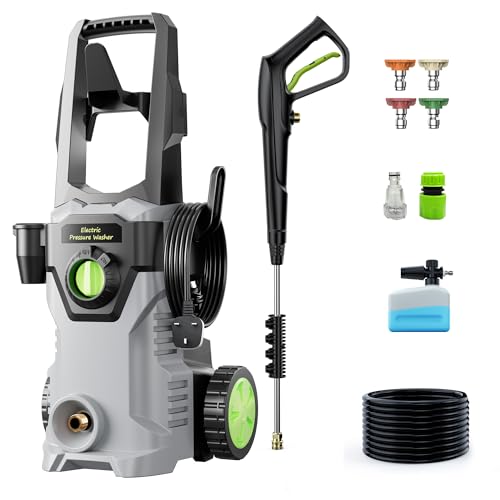
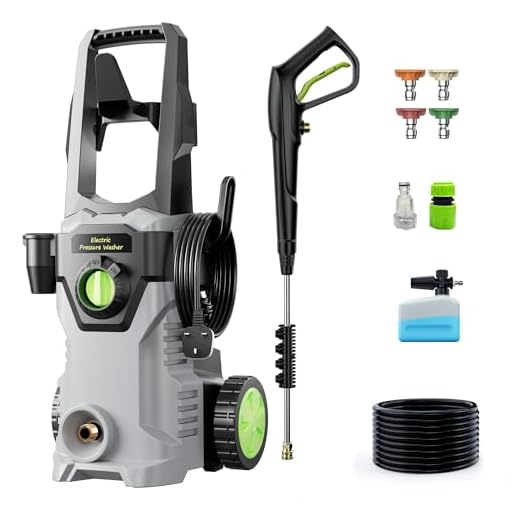
In my extensive experience testing various models, I can confidently say that for residential use, an electric cleaner outweighs its petrol counterpart in most scenarios. The convenience of plug-in operation, coupled with fewer emissions and a quieter performance, makes electric units a top choice for routine cleaning tasks around the home.
Electric devices typically range from 1,300 to 2,200 psi, which is sufficient for common applications such as patio cleaning, vehicle washing, and surface preparation. On the other hand, petrol machines offer higher pressure ratings, often exceeding 3,000 psi, making them more suitable for heavy-duty jobs like graffiti removal or industrial use. However, the associated maintenance, noise, and fuel considerations can be a disadvantage for casual users.
Choosing the ideal machine ultimately comes down to your specific cleaning needs and preferences. If you seek portability and power for extensive outdoor projects, petrol options might be appealing. However, for everyday cleaning duties, the simplicity and ease of use of electric models make them the more practical and economical solution. Evaluate your requirements carefully before making a decision, and you’ll ensure that your cleaning tasks are completed efficiently and effectively.
Recommendation
For consistent home usage and light jobs, electric models are ideal due to their convenience and ease of use. They require minimal maintenance and are typically quieter during operation. Choose an electric variant if you prioritise portability and user-friendliness, particularly if you have access to a power source nearby.
Conversely, for heavy-duty tasks and remote locations, the fuel-operated variants excel. Their power output is significantly higher, making them suitable for commercial purposes and challenging jobs. If mobility is crucial and you need to operate outside the reach of electrical outlets, fuel-powered models perform exceptionally well, providing the necessary muscle to tackle tough cleaning tasks.
Cost Considerations
Initial investment varies: electric types generally cost less upfront, while fuel alternatives can be pricier but offer greater performance. Factor in operational costs as well; electricity tends to be cheaper than fuel, leading to lower long-term expenses for electric units.
Maintenance and Longevity
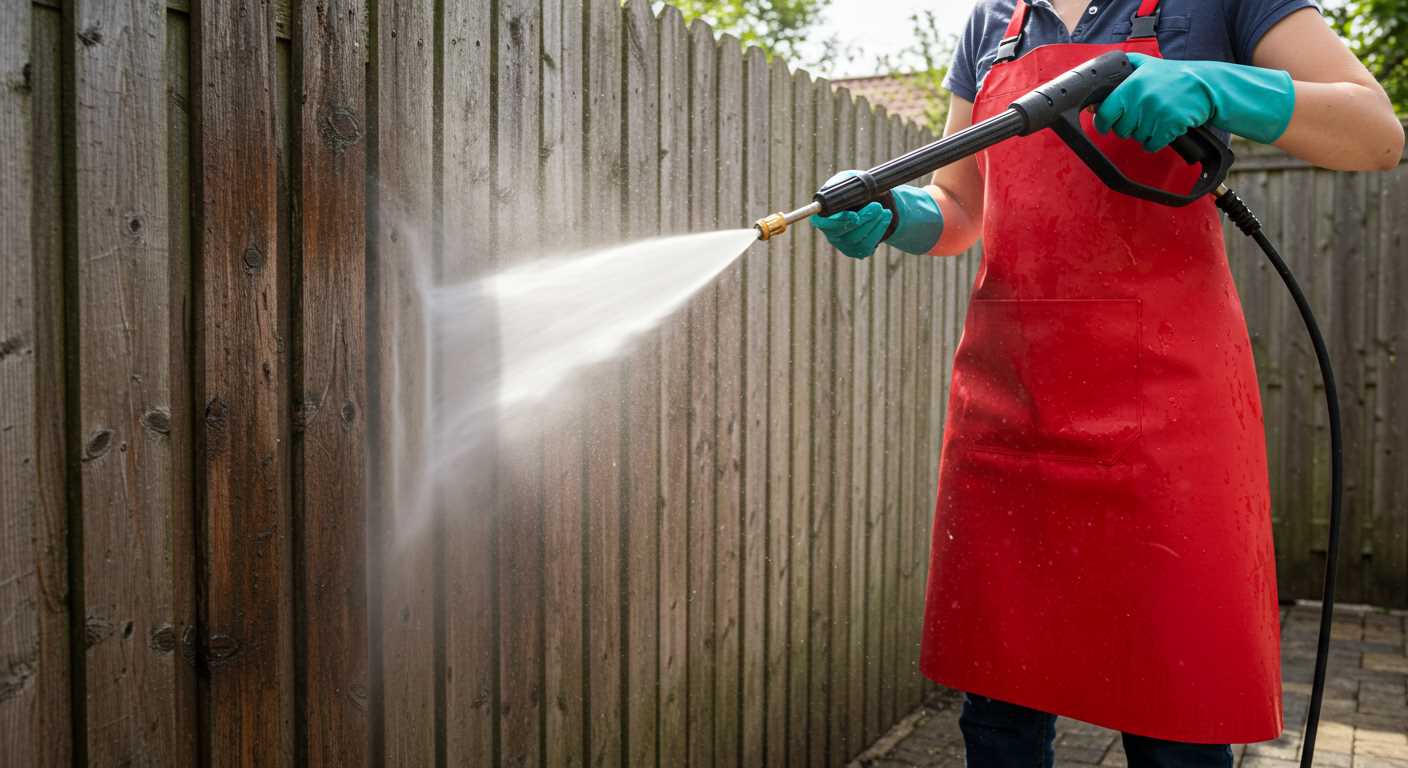
- Electric systems require less regular upkeep, primarily focused on keeping the unit clean and checking hoses.
- Fuel engines demand more frequent servicing, involving oil changes and spark plug replacements.
For longevity, electric options often outlive their fuel counterparts when properly maintained, thanks to simpler components and less wear. However, fuel types may serve longer in demanding environments due to their robust design.
Cost Comparison of Petrol vs Electric Pressure Washers
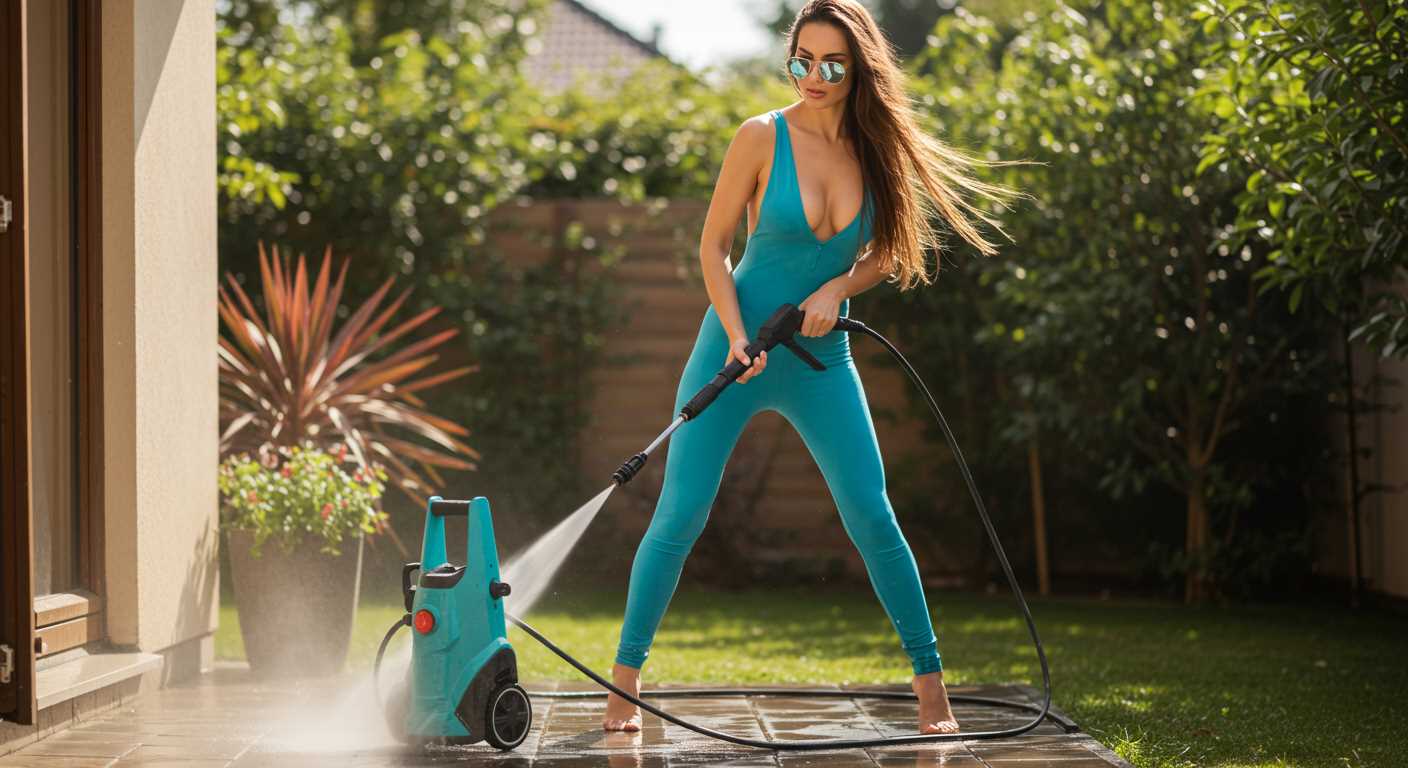
In my extensive experience, the upfront and ongoing expenses are fundamental for determining the most suitable cleaner for your needs. Electric models generally present lower initial costs, typically ranging from £100 to £300, depending on power and features. In contrast, petrol options are usually priced between £300 and £800, reflecting their more robust construction and higher performance capacity.
Operating costs reveal notable differences as well. Electric machines incur minimal expenses, primarily limited to electricity, averaging about £0.05 per hour of usage. On the other hand, those relying on petrol require fuel, which can cost around £1.50 per litre. Given that these units can consume roughly 1 to 2 litres per hour, the running cost highlights a significant disparity.
Maintenance Expenses
Regular maintenance is essential for longevity. Electric variants typically require less care, with fewer components prone to wear. However, it’s wise to account for potential replacement parts, such as hoses and seals, which usually remain affordable. Petrol models demand more attention, including oil changes, air filter replacements, and spark plug maintenance, all of which can accumulate costs over time.
Long-Term Investment
Considering long-term use, electric options may yield more savings in overall ownership costs. If you frequently tackle lighter tasks, their value becomes clear. For heavy-duty requirements, investing in petrol may justify initial expenditures due to their durability and power. Ultimately, aligning your choice with specific cleaning demands will guide your financial decision.
Noise Levels: Petrol vs Electric Pressure Washers
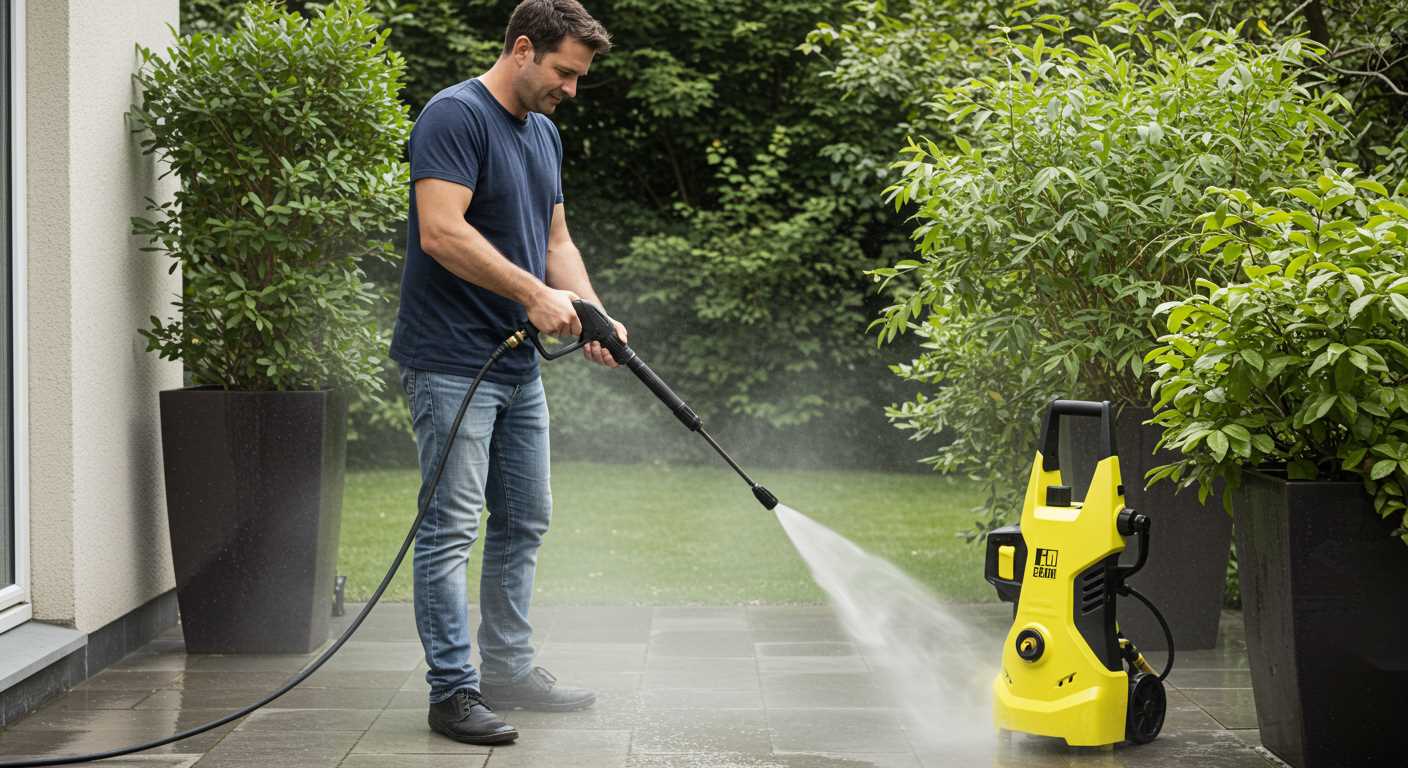
The choice between gas-powered and corded models significantly impacts noise output. Gas units typically generate noise levels from 80 to 90 decibels, which makes them quite loud and potentially disturbing in residential areas. For a practical perspective, this is akin to the sound of heavy traffic or a chainsaw in operation.
In contrast, corded models are considerably quieter, generally operating between 60 and 75 decibels. This range resembles the sound of a normal conversation or office noise, allowing for use within more populated settings without causing disruption.
| Type | Noise Level (dB) | Typical Equivalent Sound |
|---|---|---|
| Gas | 80-90 | Heavy traffic, chainsaw |
| Corded | 60-75 | Normal conversation, office |
Choosing a quieter option like a corded model is ideal for those in noise-sensitive environments. If noise isn’t a primary concern and you require more power, gas models might suit your needs. Factor in your surroundings and preferences to make an informed selection.
Maintenance Requirements
Petrol models demand regular maintenance to ensure optimal functionality. Key tasks include:
- Frequent oil changes–every 20 to 50 hours of operation is advisable.
- Air filter inspections should be performed regularly, with replacements recommended annually.
- Fuel system upkeep requires checking for stale fuel; using fresh petrol is essential, along with seasonal storage procedures.
- Regular spark plug checks can enhance performance; replace them as needed or every 100 hours.
- Examine and clean the fuel filter to prevent flow issues.
In contrast, electric variants require less intensive maintenance, focusing primarily on:
- Cabling and connectors should be regularly inspected to prevent wear and ensure safe usage.
- Cleaning the casing and nozzles can prolong device life; use a damp cloth and avoid harsh chemicals.
- Water inlet filters need occasional cleaning to maintain flow efficiency.
- Yearly checks of the power cord for any signs of damage are crucial for safety.
Considering these factors, I find that maintaining a petrol-operated unit involves more rigorous attention compared to its electric counterpart, which lends itself to a more straightforward upkeep routine. Choosing between these options should factor in the level of maintenance you are prepared to commit to.
Portability: How Do Gasoline and Electric Pressure Cleaners Differ?
In terms of mobility, electric variants are generally lighter, weighing around 20 to 30 kilograms. Their compact design makes them easily transportable, ideal for light-duty tasks or quick clean-ups. They can be plugged into a standard electrical outlet, allowing for straight-forward movement between cleaning locations without the hassle of refuelling.
Conversely, gasoline models typically weigh between 30 to 50 kilograms, influenced by the larger engines and fuel tanks. This added weight can make them cumbersome for some users, especially during longer jobs. However, the advantage lies in their independence from power sources, granting access to remote areas even without electricity, ideal for large clean-up ventures like big yards or construction sites.
For transport, electric units often feature wheels and handles, making it easy to manoeuvre around at home or work. Gasoline equipment, while usually bulkier, often has larger wheels designed for rougher terrain, accommodating outdoor surfaces without difficulty.
In summary, if your tasks often change location and require less manoeuvrability, the electric type is a sensible choice. For larger, remote projects, gasoline cleaners provide the freedom to operate without being tethered to a power source. Choose according to the specific demands of your cleaning tasks for optimal effectiveness.
Cleaning Power: Comparing PSI and GPM Ratings
For optimal cleaning results, prioritising PSI (pounds per square inch) and GPM (gallons per minute) ratings is essential. Selecting a model with a suitable combination of these metrics will significantly impact the efficiency of your cleaning tasks.
Typically, a higher PSI indicates stronger water pressure, which is crucial for removing stubborn grime, dirt, and stains from surfaces. For instance, if tackling tough surfaces like concrete or heavily soiled patios, look for units offering at least 2000 PSI. This level of pressure can strip away grime effectively without excessive effort.
On the other hand, GPM reflects the water flow rate and is equally important. A higher GPM allows for quicker cleaning as it delivers more water in less time. For larger areas or extensive cleaning sessions, aim for models with approximately 2.0–2.5 GPM. This capacity ensures adequate water coverage while maintaining pressure levels.
Finding the right balance between PSI and GPM enhances overall cleaning performance. For instance, a unit with 3000 PSI but only 1.5 GPM may clean surfaces effectively but could leave behind excess debris due to insufficient water flow. Conversely, a machine with lower PSI but higher GPM may rinse surfaces well while lacking the power needed for deeper cleaning.
When evaluating cleaning needs, consider the specific tasks at hand. For general household cleaning, a device offering at least 1800–2200 PSI and 1.5–2.0 GPM typically suffices. However, for tougher jobs such as heavy-duty vehicles or industrial surfaces, options with higher ratings become necessary to ensure satisfactory results.
In summary, the combination of PSI and GPM should guide your choice of equipment. Understanding these ratings directly influences cleaning efficiency and effectiveness, leading to cleaner surfaces in less time. Prioritising these factors during selection will yield the best performance for your intended applications.
Environmental Impact of Petrol vs Electric Options
Electric models have significantly lower emissions compared to their fuel-burning counterparts. The absence of exhaust fumes makes them a much cleaner option, contributing to better air quality. In urban settings, this can greatly reduce the impact on public health and the environment.
Additionally, the energy source for electric models can further influence their environmental footprint. Using renewable energy sources to charge these machines, such as solar or wind power, can virtually eliminate greenhouse gas emissions, making them an unparalleled choice for eco-conscious users. In contrast, combustion-based engines rely on fossil fuels, which are not only finite but also contribute heavily to carbon emissions and other pollutants.
Noise pollution is another aspect where electric machines shine. They operate with significantly reduced noise levels, making them suitable for residential areas and reducing disturbance to local wildlife. This quieter operation also lessens stress on the operators, facilitating a more pleasant cleaning experience.
Life cycle analyses reveal that the manufacturing, operation, and disposal of internal combustion engine units often result in a larger carbon footprint than electric alternatives. The materials and processes behind both types have different environmental implications, but generally speaking, the ongoing environmental costs associated with electric devices tend to be lower.
Factoring in sustainability into purchasing decisions is becoming increasingly important. Opting for renewable energy to power electrics, along with their lower operational emissions, positions them as the more environmentally responsible option in the long term.
Best Use Cases for Petrol and Electric Pressure Washers
For heavy-duty tasks such as cleaning large driveways, decks, and heavy machinery, I recommend opting for a gasoline-powered model. The higher PSI and GPM ratings allow for deep cleaning with reduced effort, making them ideal for tough jobs that require significant power.
When to Choose Electric
In contrast, electric models are perfect for lighter tasks. They excel in residential settings where noise restrictions might apply, and they’re suited for washing vehicles, patios, and outdoor furniture. Their portability makes them convenient for quick duties or when working in tight spaces.
Consider Hybrid Scenarios
If you’re working on projects that vary in scale, having both options on hand can be advantageous. For example, the ability to tackle both small garden equipment and larger outdoor surfaces makes owning one of each type a versatile choice. Electric units are excellent for everyday cleaning, while gasoline options stand ready for more demanding situations.

